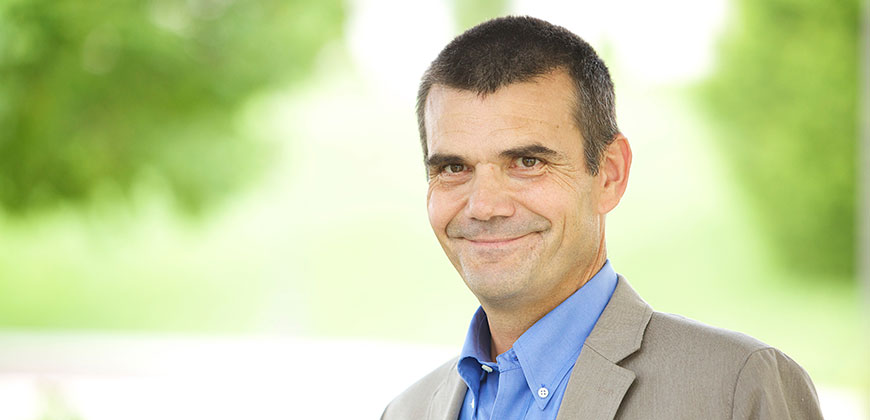
Credit: Brett Winter Lemon Photography, Inc.
Make no mistake. Jean Peccoud, a new faculty member in the Department of Chemical and Biological Engineering, likes being an academic: teaching, writing, publishing, being cited. “But at the end of the day, you can publish 200 articles that only a few people can understand. That makes a successful academic career, but that doesn’t make a big difference in the world,” he says.
So with impressive academic credentials, Peccoud, the College of Engineering’s new Abell Endowed Chair in Synthetic Biology, is motivated by making a difference, against the backdrop of his research focused on the development of genetic “languages” to design new DNA molecules. Peccoud, a native of France, joins the Colorado State University faculty from the Virginia Bioinformatics Institute at Virginia Tech, where he led the Synthetic Biology Informatics Group.
Synthetic biology: A growing field
A field less than 20 years old, synthetic biology is the application of systematic engineering methods to develop new DNA molecules. It’s taking the same principles that electrical engineers use to design circuits, and applying them to DNA, which is quickly becoming the next engineering substrate.
“When genetic engineering started, we were taking DNA in one organism and putting it in another; we were limited to cutting and pasting genes that existed in nature,” Peccoud said. “Now, we can print DNA. We have an entire DNA fabrication industry, and pretty much any DNA molecule you can think of, can be made.”
Improving biologics
In the last two years, Peccoud has become interested in working to improve the manufacturing of biologics, which are a new generation of drugs produced from living organisms. Vaccines are biologics, as are engineered antibodies used to treat cancer and autoimmune diseases. Biologics represent exciting breakthroughs in the prevention and treatment of disease, Peccoud says.
Pharmaceuticals fall into two main categories. One is small molecules, like Tylenol, which are cheap to mass-produce and thus easy to access. The other, biologics, are a different story. They are often grown in mammalian cell lines, require large, sterile reactors, and cost millions to make. The final price of these drugs reflects this significant fabrication cost, which is why even generic or off-patent versions aren’t much cheaper than the originals.
The production of biologics is a linear process and fragmented in different steps that are handled individually. Peccoud’s research goal is to make a DNA molecule designed to maximize the output of the drug purification process. This goal will fulfill Peccoud’s desire to “make a difference,” by reducing the cost of these drugs and bringing wider access to breakthrough treatments.
BioMARC, opportunities for collaboration
One of the reasons Peccoud was attracted to CSU was the BioMARC, a CSU facility for testing and producing biopharmaceutical products. What’s more, Peccoud was impressed by the deep sense of collaboration and collegiality across departments – crucial to someone who intersects both engineering and life sciences. “There is clearly a community of like-minded people on campus who are excited by synthetic biology, and there are a number of opportunities for interactions,” Peccoud said.
In his new role as Abell Chair, Peccoud will continue working as a teacher and mentor to students. Working with students is actually one of his favorite parts of academia.
“Training the next generation of scientists is a bit like raising kids,” he said. “You hope at some point, your kids will be able to do what you were not able to do yourself. The educational component of my work is becoming more and more important to me. This may be the most meaningful of all, because sometimes I get a glimpse of how working with me has made a difference in my students’ lives.”
Follow Peccoud on Twitter @peccoud.